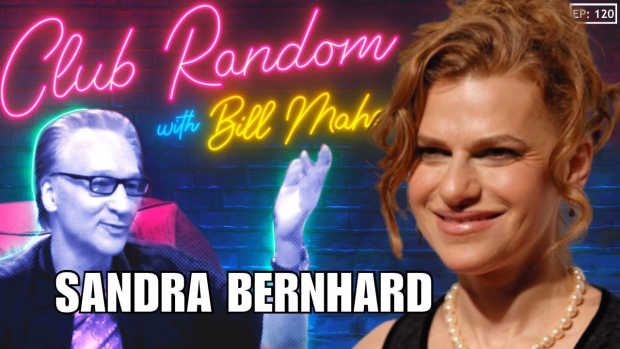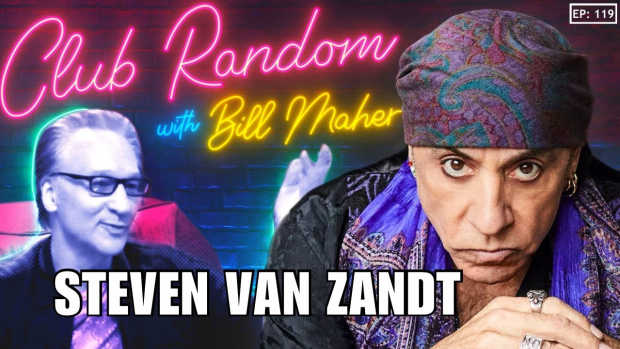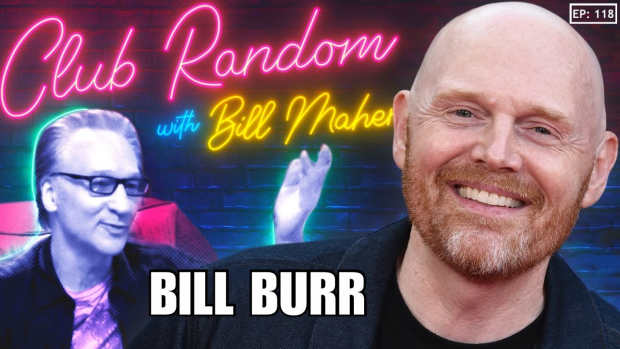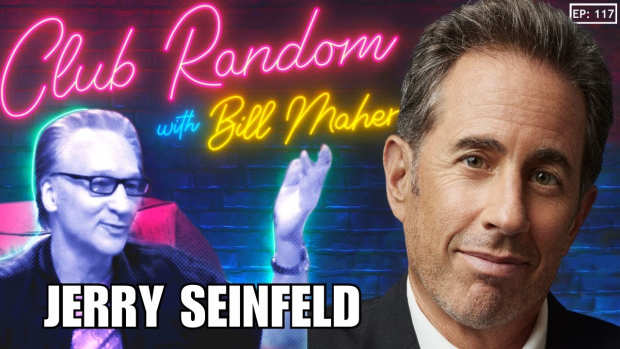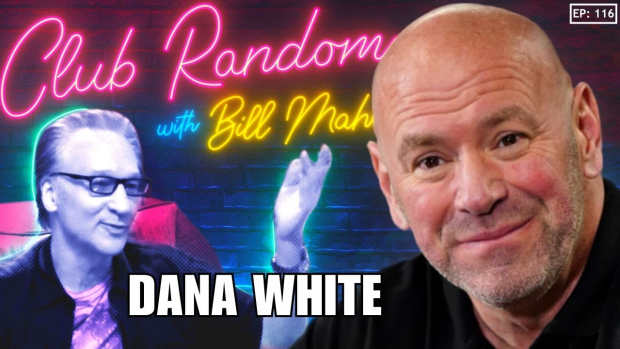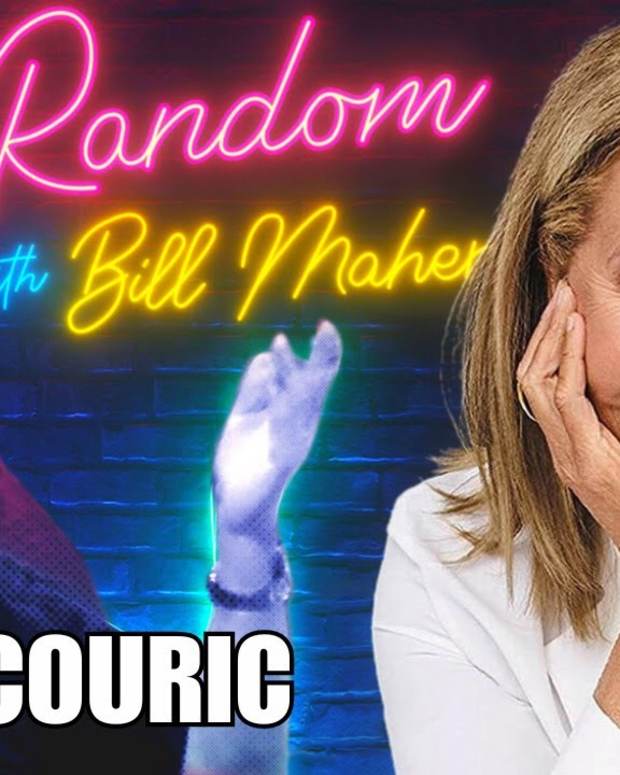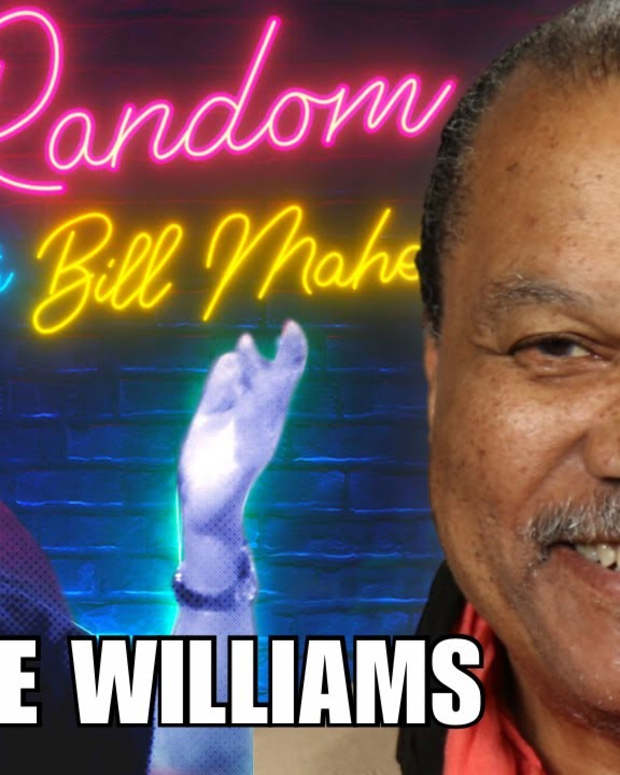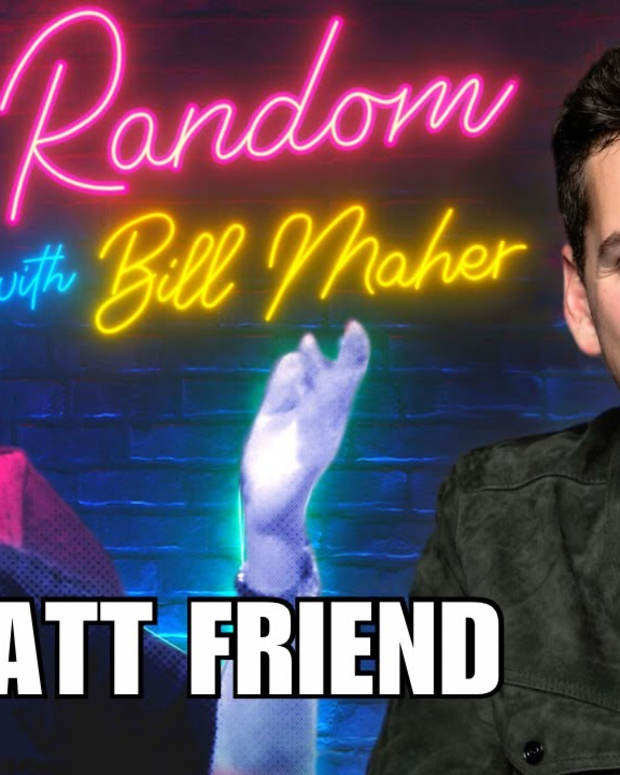John Fogerty Recalls the Moment He Became the Luckiest Man Alive
Bill Maher welcomes John Fogerty to Club Random for what appears to be plaid day at the podcast. “Nice shirt,” says the singer-songwriter and legendary frontman of Creedence Clearwater Revival, admiring Bill’s old-school checkered top that would’ve been right at home at a CCR concert in 1969. “Thanks—I wore it for you,” says Maher, complimenting his 78-year-old guest’s plaid shirt right back.
“I brought you a gift,” says Fogerty, handing Maher another plaid shirt. “My wife makes these. Her company—our company—is called Fortunate Son, of course. She has several plaid designs. This one is really pretty.”
“I like it,” says Maher, changing the subject, because there’s far more interesting stuff than plaid shirts to be diving into when your guest is the hit master behind “Proud Mary,” “Green River,” “Down on the Corner,” "Bad Moon Rising," “Run Through the Jungle,” everyone’s favorite 11-minute rendition of “I Heard It Through the Grapevine,” and several other classics that hold up over a half-century later.
“Boy, you aged well,” says Maher. “You still look like you.”
After a quick nod to the miracles of hair dye and that forever-young “rock star gene,” the rest of the conversation is all about the music—specifically its formative power for longtime Creedence fans like Maher, who counts Fogerty among his true rock heroes. In fact, Fogerty performed at the first concert Maher ever attended—at the Festival for Peace at Shea Stadium in 1970—when Maher was just 14, there with his sister, and wearing a heavy Nehru jacket on a blazing hot August evening. Nothing like music will lure out all those memories.
“Do you remember playing at it?” Maher asks him.
“Oh, yeah,” says Fogerty. “Sha Na Na was there too."
“Sha Na Na was definitely there!” says Maher.
All due respect to Bowzer and the boys, the secret to writing a great song with unlimited staying power is more Fogerty's domain. How did he do it, over and over again? “I tried to make songs that sounded good in a car,” Fogerty says simply, fielding other random questions about those brief heyday years ("What was it really like performing at Woodstock?") and weighing in on a wide range of musical influences from Irving Berlin to Elvis and the Beatles.
“You could put out an album called The Worst of the Beatles and it would still go to number one,” says Maher, who cites a joke about The Grateful Dead that will piss off every Deadhead on the planet, and adds that Elvis’s “Hound Dog” is really not a very good song at all.
“Oh, my God,” says Fogerty. “You are opinionated, you know that?”
One of the most influential rock bands of all time, CCR didn’t last long, succumbing to squabbling, ego battles, and bad financial decisions. In spite of all that, Fogerty (who’s still touring) wound up with what he calls “the golden ticket”—and it had nothing to do with hit songs, stardom, or any missed opportunities in the music biz. Here’s what saved him, he tells Maher, who’s deeply impressed but can’t really relate (see excerpt).
Bill Maher rewrites the rules of podcasting the way he did in television in this series of one-on-one, hour-long conversations with a wide variety of unexpected guests in the undisclosed location called Club Random. There’s a whole big world out there that isn’t just about politics and Bill Maher and his guests talk about all of it.
Random Moment: The Real Golden Nugget
Bill Maher: When I think of [baseball legend] Ted Williams, I think of you.
John Fogerty: Wow.
Maher: Because he could have held every record in the sport, but he gave up a lot of his good years.
Fogerty: Oh … okay.
Maher: I never really understood all the business machinations of the music industry, and I'm sure it's boring to you at this point, so I don't want to go into that. But when did it end?
Fogerty: When I met my beautiful wife, Julie.
Maher: That's not when the business part of it ended.
Fogerty: The part that actually mattered ended the moment I laid eyes on her. You know, it was literally like that. I've only said this once in my life: “That's the most beautiful girl I've ever seen.” I may have said it out loud that night. She was standing across the room—and she ended up walked up to me on a dare with a couple of her friends: “Hey, that's John Fogerty. I'm going to go shake his hand.”
Maher: Wow. Where was this event taking place?
Fogerty: It was in Indianapolis, after I had done a show there. It was in a little club called Don’t Ask.
Maher: Sure, right around the corner from Don't Tell. Great place. So I gotta say, the idea of a man fielding a question about his business life with the answer, “Doesn't matter, I met the most beautiful girl in the world,” is going to cause orgasms somewhere. Someone's going to send this to somebody and say, “You think there’s no good men left? Well, here's an 80-year-old.”
Fogerty: Well, the point being—
Maher: What year was this?
Fogerty: 1986, if I remember correctly.
Maher: I'm sure you do, because you'd be in hot water if you didn't. Wow, you’re an ultimate romantic.
Fogerty: She allowed me to be one. I'm not sure what I was before then, but I became that guy 110 percent. You know, flowers and never failing to say how I feel in my heart. In a lot of ways in business, I got effed. But I still ended up with the golden ticket.
Maher: So, you're okay looking back? You're okay with how you handled it? You have no regrets?
Fogerty: No regrets? Are you kidding? … I remember hearing Sinatra or somebody saying, "I wouldn't change a thing." I’d change everything!
Maher: I always say the same thing when people go “no regrets.” I have regrets every single day. It's what it means to be human. That you're always moving forward—which is in the dark because we haven't been there yet. Behind you is lit, because you've seen it. So, of course, it's full of regrets. Now, as you get older and wiser, those regrets become fewer because you've seen more. Because the dark is now somewhat less dark.
Fogerty: But, back to what we were talking about, I just wanted to re-emphasize that point that even though I got effed in a lot of ways—
Maher: You can’t say “fuck”?
Fogerty: If I'm going to use my chip, I'm going to use it in the best place I can use it.
Maher: That’s so old school. I kind of love that. You’re right, it is overused.
Fogerty: The fact that I found this gigantic gold nugget that everyone else is looking for, and here I was, you know, a shipwrecked dude on the beach with no shoes and his pants ripped up to here. I'm stumbling along and found the gold nugget.
Maher: Wait, what are we talking about?
Fogerty: My wife.
Maher: Oh, right. [laughing] You lost me on the island with the ripped pants.
Fogerty: The point being—I knew it. I knew what that meant. As I told her, probably a week into it, ‘Honey, being one day with you is worth the 20 years in hell.”
Maher: Holy shit.
Fogerty: Because that’s what’s important. The love of your life.
Maher: That's such a profound point. I’m serious. It’s actually been a theme in my life from when I got a girlfriend when I was 16 and then she dumped me when I was 17. It was so devastating that I remember thinking at the time—and ever since—where do you put your eggs in life? Do you put them in love or in career? And I think because of that elementary moment in my life and the pain that it caused at 17, I always put it in career. I can control that. Another person I cannot control. They could leave me. They could die. I could change. They could change. But career, I can control that.
Fogerty: Hmm.
Maher: I just signed a new deal with HBO. I just thought I'd throw that in right now.
[Laughter]
